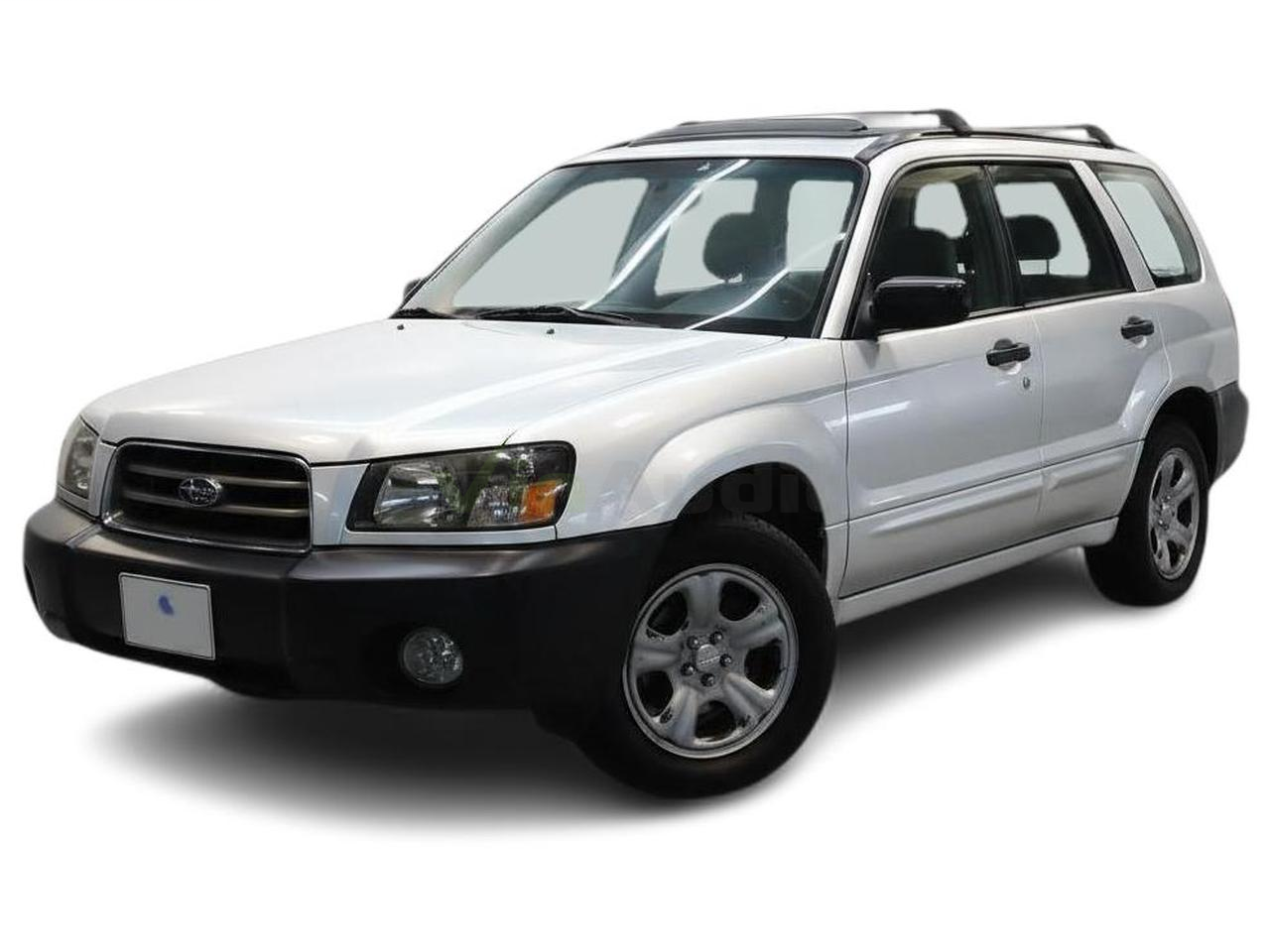The Good
The 2005 Subaru Forester boasts strong reliability and standard all-wheel drive, appealing to practical buyers seeking a dependable and safe vehicle. The turbocharged XT trim offers sporty performance. Its comfortable ride and ample cargo space make it practical for families. The Forester's rugged image and "go-anywhere" attitude can emotionally appeal to adventurous drivers.
The Bad
Potential weaknesses of the 2005 Subaru Forester include head gasket issues, particularly in non-turbo models. Oil consumption can be a concern. Some owners have reported issues with the automatic transmission. Rust can also be a problem, especially in areas with harsh winters. It is important to have a pre-purchase inspection to check for these issues.
2005 Subaru Forester: Quick Overview
Key specs for the 2005 Subaru Forester:
- Engine Options:
- 2.5L SOHC naturally aspirated 4-cylinder (X, XS)
- 2.5L SOHC turbocharged 4-cylinder (XT)
- Horsepower:
- Naturally aspirated: 165 hp
- Turbocharged: 210 hp
- Fuel Economy (EPA estimated):
- Naturally aspirated: 22 mpg city / 29 mpg highway
- Turbocharged: 19 mpg city / 24 mpg highway
- 0-60 mph Times:
- Naturally aspirated: 9.3 seconds (approx.)
- Turbocharged: 6.5 seconds (approx.)
- Towing Capacity:
- 2,000 lbs (with trailer brakes)
- Trim Level Features:
- X: Base model, all-wheel drive, power windows and locks, air conditioning, CD player.
- XS: Adds alloy wheels, upgraded cloth upholstery, keyless entry, cruise control.
- XT: Adds turbocharged engine, sport-tuned suspension, leather upholstery, automatic climate control (some models), sunroof (optional), upgraded audio system (optional).
2005 Subaru Forester Specifications
Vehicle Information
| Year | 2005 |
| Make | Subaru |
| Model | Forester |
| Trim | - |
| Style | - |
| Type | Wagon |
| Category | Minivan |
Manufacturing Details
| Made In | Japan |
| Manufacturing City | - |
Dimensions
| Doors | 4-Door |
| Curb Weight | - |
| Gross Vehicle Weight Rating | - |
| Overall Height | - |
| Overall Length | - |
| Overall Width | - |
| Wheelbase Length | - |
| Standard Seating | - |
Engine & Performance
| Engine | 2.5 L 4-Cyl. |
| Engine Size | 2.5L |
| Engine Cylinders | 4 |
| Transmission | 4 Automatic |
| Transmission Type | Automatic |
| Transmission Speeds | 4-Speed |
| Drivetrain | All-Wheel Drive |
Additional Features
| Anti-Brake System | - |
| Steering Type | - |
Pricing
| Manufacturer Suggested Retail Price (MSRP) | - |
| Invoice Price | - |
| Delivery Charges | - |
Vehicle History Report
Specifications
History
Events
History Check
Check
Check
Check
Check
Listings
Recalls
Check
Analysis
What Problems Does the 2005 Subaru Forester Have?
Another common issue is oil consumption, which can lead to engine damage if not carefully monitored and addressed. The automatic transmission can also experience problems, such as harsh shifting or slipping, although this is less frequent than head gasket issues.
Rust is a concern, particularly in areas with salted roads. Check the undercarriage, wheel wells, and rocker panels for corrosion. Recalls for the 2005 Forester have addressed issues like potential fuel leaks and brake light switch failures; check the NHTSA website for a complete list of recalls and ensure any outstanding recalls have been addressed.
Long-term reliability concerns often revolve around the longevity of the engine given the head gasket and oil consumption issues. Regular and proactive maintenance, including timely oil changes and coolant flushes, can help mitigate these problems.
How long will the 2005 Subaru Forester last?
The primary long-term durability concerns revolve around the engine. Head gasket issues, as mentioned earlier, are a major factor in determining the lifespan of the vehicle. Rust can also significantly impact the longevity, particularly in colder climates. Paying attention to these weak points and proactively addressing them is key to maximizing the vehicle's lifespan.
Positive Owner Reviews
Negative Owner Reviews
What Technology & Safety Features are Included?
Safety features include standard anti-lock brakes (ABS) and front airbags. Side airbags were optional on some trims. There were no advanced driver-assistance systems (ADAS) like lane departure warning or automatic emergency braking available.
Optional features varied by trim and could include a sunroof, upgraded audio system, and leather upholstery. The XT trim, in particular, could be equipped with more premium features.
In terms of crash-test ratings, the 2005 Subaru Forester generally performed well. The Insurance Institute for Highway Safety (IIHS) gave it a "Good" rating in frontal offset crash tests. The National Highway Traffic Safety Administration (NHTSA) gave it four or five stars in its frontal and side impact tests. However, it's crucial to remember that crash-test standards have evolved significantly since 2005.
What Colors Options are Available?
Exterior Colors
Interior Colors
2005 Subaru Forester Prices and Market Value
Factors affecting resale value include the vehicle's condition (especially rust), mileage, maintenance history, and the presence of any known issues like head gasket problems. Turbocharged XT models generally command a higher price than naturally aspirated models, assuming they are in comparable condition. The all-wheel-drive system contributes to its value, particularly in regions with snow or inclement weather.
2005 Subaru Forester Cost of Ownership
2005 Subaru Forester Fuel Efficiency
2005 Subaru Forester Safety Rating
NHTSA
2005 Subaru Forester Insurance
reasonable repair costs.
How Does the 2005 Subaru Forester Compare to Other Wagon?
In terms of reliability, the CR-V and RAV4 are generally considered more reliable than the Forester, primarily due to the potential head gasket issues. However, a well-maintained Forester can still provide years of reliable service. Performance-wise, the turbocharged Forester XT offers a significant advantage over the base models of its competitors, providing a more engaging driving experience.
Feature-wise, the Forester is comparable to its rivals. However, the CR-V and RAV4 may offer slightly more refined interiors and features in higher trim levels.
In terms of price, a used Forester may be slightly more affordable than a CR-V or RAV4 of the same year and condition, especially considering the potential repair costs. Similar alternatives include the Mazda Tribute/Ford Escape (more affordable but less refined) and the Saturn VUE (mixed reliability). If reliability is a top priority, the Honda CR-V or Toyota RAV4 might be better choices, even at a slightly higher price. For sporty performance, the Forester XT is a strong contender.
Ranks #465 Sedan
| 1 | 2023 Toyota Camry | (5.0★) |
| 2 | 2023 Honda Accord | (0.0★) |
| 3 | 2023 Lexus ES | (0.0★) |
| 4 | 2024 Subaru Legacy | (5.0★) |
| 5 | 2022 Mazda MX-30 | (4.0★) |
| 6 | 2024 BMW M3 | (0.0★) |
| 7 | 2023 Ford Mustang | (5.0★) |
| 8 | 2023 Mercedes-Benz AMG GT | (0.0★) |
| 9 | 2023 Audi A3 | (0.0★) |
| 10 | 2023 Chevrolet Camaro | (5.0★) |
| 11 | 2023 Hyundai Elantra Hybrid | (0.0★) |
| 12 | 2023 Nissan Altima | (4.0★) |
| 465 | 2005 Subaru Forester | (5.0★) |
Final Verdict: Is the 2005 Subaru Forester a Good Wagon?
Eddie Shore1920 on November 27, 2023
Best Subaru Ever!I bought this vehicle brand new for my 50th, and yes, it almost has a personality. I trust my Subaru unconditionally and I plan to drive for many more years.
Victor on May 27, 2023
Comfort at its best!This vehicle is like a living entity that provides comfort and safety. It was definitely worth the purchase. I plan to own this vehicle for many years to come.
Bane4 on April 28, 2021
273,000 miles...so far!I own a 2005 Subaru forester, LL Bean addition. It has 273,000 miles on it and it runs like it's new! I bought it used and replaced the water pump, timing chain, and gaskets as a preventive measure and it runs like it's a new car. I found that the repairs and parts are very reasonable compared to other cars I've owned. I live in Colorado and the Forester is amazing on snow. I live on a fairly steep Hill and this is the first car can handle it with no problem. It is an ample power, but if you want more power there is always the turbo option. The Forester can handle a surprising amount of cargo when needed, if you put the seats down and the ample headroom allows me to put my dog's crate in the back when needed. I have several friends who are hard core Subaru fans and now I completely understand why!
Krag on July 7, 2020
Head gasket issues.In 2005 Subaru experimented with cellulose for head gasket material. Before any long trips, change it out- any where from $1000 to 2000. Other wise, good car
Jeffnglenda on September 18, 2019
Best all around car ever.Bought it new in 2005 and it has exceeded all our expectations. Essentially trouble free and totally reliable. Simply put, it's the best car I’ve ever owned. Classic design, it will never look old!
Idorablo on April 19, 2019
Great Car For The MoneyThis car met all my needs has plenty of room great commute car excellent on gas and it's just amazing how it handles and rain.
oldMGguy on December 27, 2018
Beautiful car with many reliable miles left in it.This car is very roomy but compact in size. Very comfortable with leather seating, automatic transmission and all wheel drive. Quite sure-footed and comfortable to drive. Also, averages 25+ mpg. Economical to purchase and operate.
Jacob on December 19, 2018
Just bought it with 120k milesThis is the perfect commuter car for back and forth to work ! It’s really good on gas and just enough room for my dogs and I.
JuJuBee on December 13, 2018
Head GasketsOne comment on here complained about head gasket problems. Torque the heads every 50,000 to 60,000 miles and you will not have a head gasket problem.
Dave-in-CT on June 11, 2018
A great car with a problem.A head gasket problem. Motors shouldn't need head gaskets for at least 250,000 miles. Subaru gave us a new engine design in 1999 and for the next 12 years various models in their line-up had head gasket issues. They never truly accepted the problem as their fault so owners had to foot the $2000+ bill themselves. Other than this huge issue, the car was always solid and dependable. With good tires, it could go anywhere. But head gaskets at 130,000 miles left a very bad taste in my mouth and I switched to Honda. If you find this car for sale, find out if the head gaskets have been replaced. If so, you've found a great car. If not, buyer beware!

